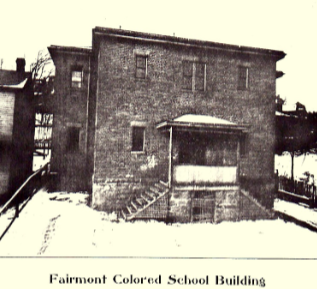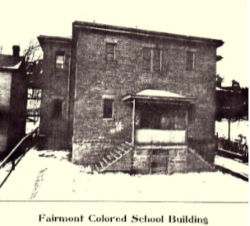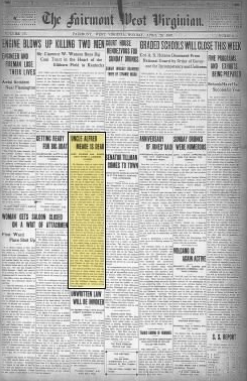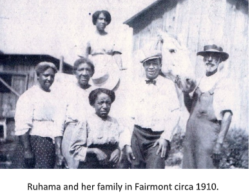Our Diverse Heritage: Marion’s Black History Part 4
Celebrating Black History Month in Marion County
February 6, 2024
Read Part 1 here , Part 2 here Part 3 here.
Part 4: Alfred Meade’s Public Service
In 1868, Francis Pierpont and other key leaders arranged a bank loan of $125 to Meade and black supporters Bossy Lewis, Link Jones, John Jackson, Peter Fagan, Tansy Hill and Benjamin Jackson to buy a lot for off Jackson and Madison Street to house the first public school for black children. Work was held on Saturdays when black volunteers had a day off. The Freedmen’s Bureau and others raised $750. The school opened in 1869 with Miss Ella Jones as teacher. Pierpont volunteers for adult education and Governor A. B. Fleming donated the first book for the school’s library. By the end of the century, a brick structure was built to expand the school.
The School in 1902. This building was on the site of the original school Meade and others organized.
It became known as Dunbar School.
Meade continued to be an influential member of the community. The Wheeling Intelligencer and Daily Register as well as the Richmond Dispatch noted that Meade was a delegate to the June 1870 West Virginia Republican convention: “Alfred Meade, a mild mulatto, will represent Marion County “loyalty” in the Radical State Conventions next Wednesday. Alfred is said to be the best man in the delegation, Peirpoint [sic] and the rest being far below Mead-iocrity.” By 1871 the Wheeling government had lost power, and their state constitution was discarded by a public referendum. A new state constitution was written in 1872. Pierpont lost his seat in the House of Delegates. Although the new constitution guaranteed Blacks the right to vote and hold public office, it provided for separate schooling and forbade the teaching of Blacks and Whites in the same school. In 1873 the legislature limited jury duty to White males. By 1876 seven of the eight successful candidates for state offices, including the governorship, had served in the Confederate army. Helen Wilson Meade, Alfred’s second wife, died in 1888. All of their children were educated in the Fairmont Colored School. The Mountain City House was razed in the late 1890s for the construction of the new Marion County Courthouse. By this time, Meade was in his 80s. He passed away April 27, 1907. At the time of his death, he owned many lots and buildings in Fairmont.
The Fairmont Times and Clarksburg Exponent published Meade’s obituary on the front page, “Mr. Meade was probably the best-known colored man in the State and his death, while expected, is
deeply regretted.” His obituary noted he was married several times and father of twenty-one children, though only eight survived by the time of his death. Meade is buried in the old City Cemetery near Windmill Park. A prominent marker can be found on the north side of the softball field in a tangle of shrubs and trees.
Mead’s Influence
An interesting note about Meade’s case against Johnson came from a judge in the Mid-West around 1901. Henry Clay McDougal, a Marion County native, was a famous lawyer and judge in Missouri. He also became a personal adviser and confidant for several U.S. presidents. McDougal, a well-known speaker and author, returned to Fairmont often throughout his lifetime and always visited his old friend, Alfred, whom he credited for saving his life at the Mountain City Home prior to the Civil War. In 1901, McDougal wrote a loving letter to Meade. Upon learning of Meade’s death on April 27, 1907, McDougal shared the letter with various newspapers around the state. He later included it prominently in his 1910 book ‘Recollections” with this introduction: “Alfred Meade, Fairmont, West Virginia: This mulatto was born a Virginia slave. Up to the day of his death in 1907, few men of any color were blessed with more real friends, and I never knew one who more deserved them. His suavity, gentleness, and rare, good sense may have been inherited from his slave mother, or from his father, who was reputed to have been once the Governor of that ancient commonwealth; but I never questioned and never knew.” The original letter then follows, extolling the relationship between Meade and young McDougal as well as their continued friendship over the years.
While Johnson did not pay any money to Meade, he did help Ruhama financially after her divorce. He purchased land in Harrison County where she lived on her own farm with her 5 sons according to the 1870 census. Around 1881, Ruhama sold the property, and the proceeds were divided equally among herself and her sons. She then moved to Fairmont and died there in 1911.
Ruhama and her family in Fairmont circa 1910.
The key take-away from Alfred’s story is that he came to Fairmont prior to the Civil War while it was the state of Virginia. Yet he found the ability to prosper, own property and advocate for his community.
Request a copy of our Civil War or Marion County History Guide here.



